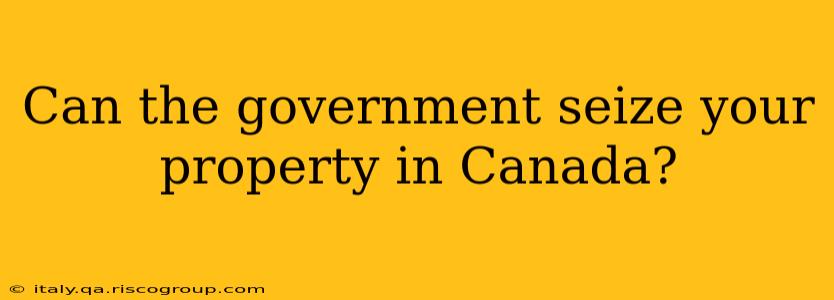Can the Government Seize Your Property in Canada? Understanding Expropriation
The question of whether the Canadian government can seize your property is complex, hinging on the legal principle of expropriation. While the short answer is yes, the process is governed by strict legal frameworks designed to protect property owners' rights. Understanding these frameworks is crucial for any Canadian homeowner or property owner.
This article delves into the intricacies of expropriation in Canada, exploring the circumstances under which it can occur, the compensation process, and the rights you possess as a property owner.
What is Expropriation?
Expropriation, also known as compulsory acquisition, is the power of the government (federal, provincial, or municipal) to take private property for public use. This power is enshrined in the Canadian Constitution and further defined by provincial legislation. It's a significant intervention with potentially devastating financial and emotional consequences for property owners. However, it's a necessary tool for governments to undertake projects deemed to be in the public interest, such as:
- Infrastructure projects: Building roads, highways, railways, pipelines, and public transit systems.
- Public utilities: Establishing water treatment plants, power lines, and other essential services.
- Public works: Constructing schools, hospitals, parks, and other public facilities.
- Conservation efforts: Protecting environmentally sensitive areas.
When Can the Government Expropriate Your Property?
The government cannot arbitrarily seize your property. Several conditions must be met:
- Public purpose: The taking of your property must serve a clearly defined public purpose. The courts rigorously scrutinize this requirement. A vague or poorly defined public purpose is insufficient grounds for expropriation.
- Necessity: The government must demonstrate that the taking of your property is necessary for the public purpose and that there are no reasonable alternatives. This often involves exploring and documenting other potential locations or solutions.
- Fair compensation: This is arguably the most crucial aspect. The government is legally obligated to compensate you fairly for the market value of your property, as well as any additional losses incurred due to the expropriation. This might include relocation costs, business disruption, and loss of profits.
What are Your Rights as a Property Owner?
You have significant rights during an expropriation process:
- Right to notice: You're entitled to proper notice of the government's intentions.
- Right to negotiate: You have the right to negotiate with the government regarding the terms of the expropriation, including compensation.
- Right to legal counsel: You can seek legal advice and representation to protect your interests.
- Right to appeal: If you're dissatisfied with the compensation offered, you can appeal the government's decision to an appropriate court or tribunal.
Determining Fair Market Value: A Critical Consideration
The determination of fair market value is often a point of contention. Independent appraisals are frequently used, and disagreements may lead to lengthy legal battles. It's essential to obtain your own independent valuation to ensure you receive appropriate compensation.
The Importance of Legal Advice
Navigating the expropriation process can be daunting. Seeking legal counsel from a qualified lawyer specializing in real estate law or expropriation is highly recommended. They can guide you through the legal complexities, negotiate on your behalf, and represent you in any appeals.
This information is for general guidance only and does not constitute legal advice. For specific legal advice related to your situation, consult a legal professional.

